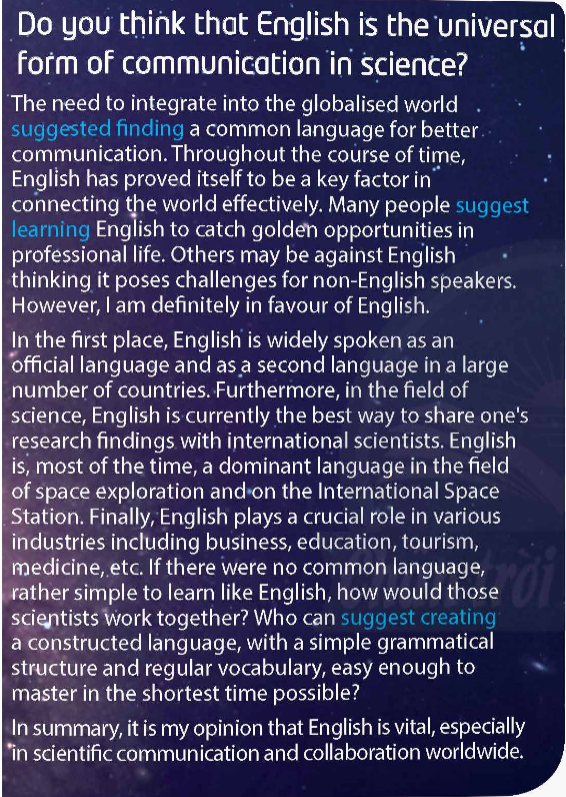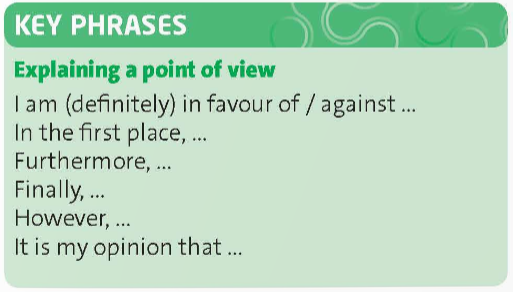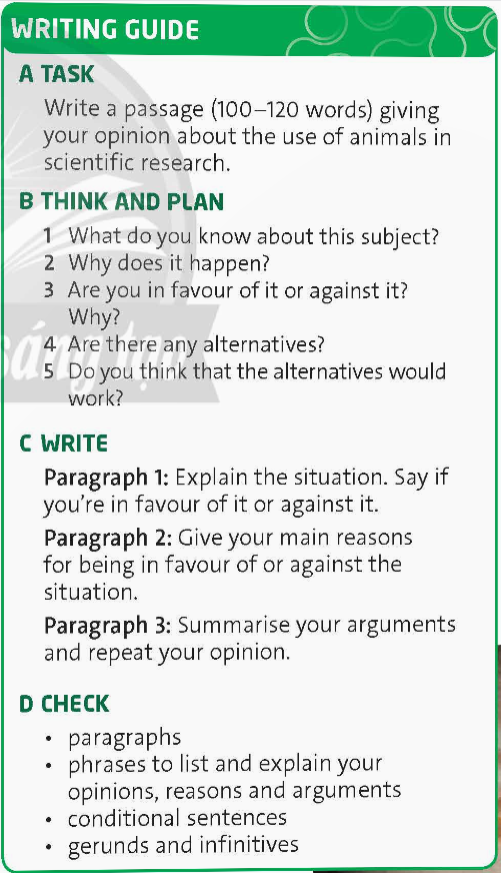THINK! Do you think English is useful in the field of science, e.g. space exploration? Why / Why not?
Writing: An opinion passage
THINK! (SGK Friends Plus - Trang 57)
Thảo luận (1)
Activity 1 (SGK Friends Plus - Trang 57)
Read the passage and answer the questions.
1. How many reasons does the writer give in favour of the importance of English in the field of science?
2. Which of the opinions do you agree or disagree with?
3. Which conditional sentences does the writer use?

Thảo luận (1)Hướng dẫn giải1. The writer gives three reasons in favor of the importance of English in the field of science:
- English is widely spoken as an official language and as a second language in many countries.
- English is currently the best way to share research findings with international scientists.
- English plays a crucial role in various industries including science, business, education, tourism, and medicine.
(Người viết đưa ra ba lý do ủng hộ tầm quan trọng của tiếng Anh trong lĩnh vực khoa học:
- Tiếng Anh được sử dụng rộng rãi như ngôn ngữ chính thức và ngôn ngữ thứ hai ở nhiều quốc gia.
- Tiếng Anh hiện là phương tiện tốt nhất để chia sẻ kết quả nghiên cứu với các nhà khoa học quốc tế.
- Tiếng Anh đóng vai trò quan trọng trong nhiều ngành công nghiệp khác nhau bao gồm khoa học, kinh doanh, giáo dục, du lịch và y học.)
2. Personally, I agree with the writer’s opinion that English is important for scientific communication and collaboration worldwide. English has indeed become the lingua franca of science and facilitates efficient communication and sharing of knowledge among scientists from different linguistic backgrounds. However, I also acknowledge that efforts should be made to ensure inclusivity and accessibility for non-English speakers in the scientific community.
(Cá nhân tôi đồng ý với quan điểm của người viết rằng tiếng Anh rất quan trọng trong giao tiếp và hợp tác khoa học trên toàn thế giới. Tiếng Anh thực sự đã trở thành ngôn ngữ chung của khoa học và tạo điều kiện thuận lợi cho việc giao tiếp và chia sẻ kiến thức hiệu quả giữa các nhà khoa học thuộc các nền tảng ngôn ngữ khác nhau. Tuy nhiên, tôi cũng thừa nhận rằng cần phải nỗ lực để đảm bảo tính toàn diện và khả năng tiếp cận của những người không nói tiếng Anh trong cộng đồng khoa học.)
3. The writer uses the second conditional sentence: If there were no common language, rather simple to learn like English, how would those scientists work together?
(Người viết sử dụng câu điều kiện loại hai: Nếu không có ngôn ngữ chung, khá dễ học như tiếng Anh thì các nhà khoa học đó sẽ làm việc cùng nhau như thế nào?)
(Trả lời bởi Nguyễn Quốc Đạt)
Activity 2 (SGK Friends Plus - Trang 57)
Find the key phrases in the text. Which phrases ...
1. help to express an opinion?
2. help to contrast different ideas?
3. help to list reasons and arguments?

Thảo luận (1)Hướng dẫn giải1.
I am (definitely) in favour of / against ... (Tôi (chắc chắn) ủng hộ / chống lại...)
It is my opinion that ... (Theo quan điểm của tôi thì ...)
2.
However, ... (Tuy nhiên, ...)
3.
In the first place, ... (Đầu tiên, ...)
Furthermore, ... (Hơn nữa, ...)
Finally, … (Cuối cùng, ...)
(Trả lời bởi Nguyễn Quốc Đạt)
Activity 3 (SGK Friends Plus - Trang 57)
Study the words in blue in the passage. Then complete the sentences.
1. Some doctors suggest (experiment with AI) _____
2. Many scientists suggest (create more satellites) _____
3. World scholars suggest (carry out further research) _____
4. Researchers suggest (develop submarine technology) _____
Thảo luận (1)Hướng dẫn giải1. Some doctors suggest experimenting with AI.
(Một số bác sĩ đề nghị thử nghiệm với AI.)
2. Many scientists suggest creating more satellites.
(Nhiều nhà khoa học đề nghị tạo thêm vệ tinh.)
3. World scholars suggest carrying out further research.
(Các học giả trên thế giới đề xuất tiến hành nghiên cứu sâu hơn.)
4. Researchers suggest developing submarine technology.
(Các nhà nghiên cứu đề xuất phát triển công nghệ tàu ngầm.)
(Trả lời bởi Nguyễn Quốc Đạt)
Activity 4 (SGK Friends Plus - Trang 57)
USE IT! Follow the steps in the Writing Guide.

Thảo luận (1)Hướng dẫn giảiIf I were to consider the use of animals in scientific research, I would advocate for stringent ethical guidelines and alternatives wherever possible.
While acknowledging the invaluable contributions that animal research has made to medical advancements, it’s essential to minimize animal suffering and prioritize humane treatment. Furthermore, if a comprehensive framework were in place, including strict regulations, transparent reporting, and increased funding for alternative methods such as computer simulations and tissue cultures, we could significantly reduce the number of animals used in experiments while still advancing scientific knowledge and medical breakthroughs.
In summary, striking a balance between scientific progress and animal welfare is paramount in shaping a more ethical and compassionate approach to research.
Tạm dịch:
Nếu tôi xem xét việc sử dụng động vật trong nghiên cứu khoa học, tôi sẽ ủng hộ các hướng dẫn và giải pháp thay thế nghiêm ngặt về mặt đạo đức nếu có thể.
Mặc dù thừa nhận những đóng góp vô giá mà nghiên cứu trên động vật đã mang lại cho những tiến bộ y học, nhưng điều cần thiết là phải giảm thiểu sự đau khổ của động vật và ưu tiên điều trị nhân đạo. Hơn nữa, nếu có một khuôn khổ toàn diện, bao gồm các quy định nghiêm ngặt, báo cáo minh bạch và tăng tài trợ cho các phương pháp thay thế như mô phỏng máy tính và nuôi cấy mô, chúng ta có thể giảm đáng kể số lượng động vật được sử dụng trong thí nghiệm trong khi vẫn nâng cao kiến thức khoa học và đột phá y học.
Tóm lại, tạo sự cân bằng giữa tiến bộ khoa học và phúc lợi động vật là điều tối quan trọng trong việc hình thành cách tiếp cận nghiên cứu có đạo đức và nhân ái hơn.
(Trả lời bởi Nguyễn Quốc Đạt)